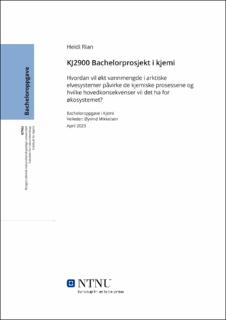| dc.contributor.advisor | Mikkelsen, Øyvind | |
| dc.contributor.author | Rian, Heidi | |
| dc.date.accessioned | 2023-06-14T17:19:52Z | |
| dc.date.available | 2023-06-14T17:19:52Z | |
| dc.date.issued | 2023 | |
| dc.identifier | no.ntnu:inspera:146699659:66000031 | |
| dc.identifier.uri | https://hdl.handle.net/11250/3071420 | |
| dc.description.abstract | I denne oppgaven blir det sett på de kjemiske prosessene; kjemisk forvitring av overflatebergarter i nedbørsfeltet, kompleksdannelse av metaller, utvasking av organisk materiale og økt tilførsel av utvalgte tungmetaller fra antropogene kilder i elvesystemer på Svalbard. I tillegg blir det sett på hvordan disse kan endres ved en økning i vannmengden grunnet globale klimaendringer. Det blir tatt utgangspunkt i Bayelva på Svalbard. De litterære funnene tyder på at en økning i vannmengdene kan føre til en økning i organisk og uorganisk materiale i elva, som kan gi konsekvenser for fjordsystemene og de kjemiske forholdene i Bayelva.
Det kan på bakgrunn av økningen av vannmengdene også forventes en økning i kompleksdannelse mellom det organiske materialet, som humus, og det uorganiske materialet, som metaller og tungmetaller. Økt biotilgjengelig toksiske metaller forventes å føre til negative konsekvenser for det biologiske mangfoldet på Svalbard og gi endringer i økosystemets balanse. | |
| dc.description.abstract | In this assignment, the following chemical processes are examined: chemical weathering of surface rocks in the catchment area, complexation of metals, leaching of organic material, and increased input of selected heavy metals from anthropogenic sources in river systems in Svalbard. In addition, the examination is focused on how these processes may change with an increase in water volume due to global climate changes. The study is based on Bayelva in Svalbard. Literature findings suggest that an increase in water volume may lead to an increase in organic and inorganic material in the river, which can have consequences for the fjord systems and the chemical conditions in Bayelva. It can also be expected that the increase in water volume will lead to an increase in complexation between the organic material, such as humus, and the inorganic material, such as metals and heavy metals. The increased bioavailable toxic metals are expected to have negative consequences for the biological diversity in Svalbard and can cause changes in the balance of the ecosystem. | |
| dc.language | nob | |
| dc.publisher | NTNU | |
| dc.title | Hvordan vil økt vannmengde i arktiske elvesystemer påvirke de kjemiske prosessene og hvilke hovedkonsekvenser vil det ha for økosystemet? | |
| dc.type | Bachelor thesis | |
